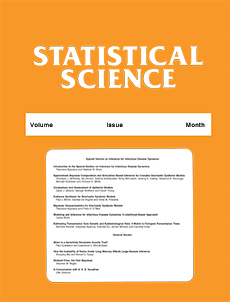Abstract
Toward the last quarter of the 20th century, the emergence of single-molecule experiments enabled scientists to track and study individual molecules’ dynamic properties in real time. Unlike macroscopic systems’ dynamics, those of single molecules can only be properly described by stochastic models even in the absence of external noise. Consequently, statistical methods have played a key role in extracting hidden information about molecular dynamics from data obtained through single-molecule experiments. In this article, we survey the major statistical methodologies used to analyze single-molecule experimental data. Our discussion is organized according to the types of stochastic models used to describe single-molecule systems as well as major experimental data collection techniques. We also highlight challenges and future directions in the application of statistical methodologies to single-molecule experiments.
Citation
Chao Du. S. C. Kou. "Statistical Methodology in Single-Molecule Experiments." Statist. Sci. 35 (1) 75 - 91, February 2020. https://doi.org/10.1214/19-STS752
Information





